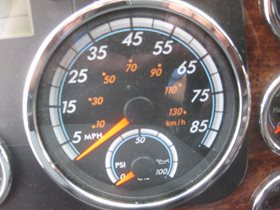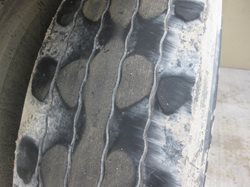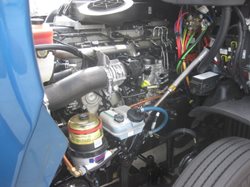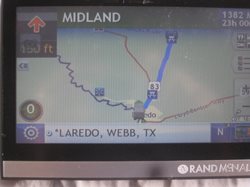

There always seems to be much debate over the subject of “what is the best speed to operate while still being the most profitable”.
Many factors go into finding the correct balance of speed vs time. First, freight rates are generally paid by the mile. This is the same as piece rate…the faster you drive, the more money you make per hour. I did some calculating at 60, 65 and 70 mph with a fuel cost of 3.70. I figured on fuel mileage varying from 6.5 to 7.5 and revenue per mile ranging from 1.30 to 1.90. I based the fuel mileage variance per speed at the universally accepted rate of one tenth of a mile per gallon, per mile per hour of road speed. I don’t like this accepted rule due to the fact that fuel consumption vs speed changes on a bell curve and not a straight line. Each mile per hour consumes fuel at a greater rate than the mile per hour before it. The difference in fuel mileage from 65 to 70 is much greater than the change from 60 to 65. At this point, I would encourage you to figure out what your fuel cost is per mile and per hour at any given speed. Next, figure out what your revenue is per mile and per hour. Minus your fuel cost per hour from your revenue per hour and you’ll find that in all of these cases, its more profitable to drive faster. This is an easy equation which leaves us to think that driving faster means higher profit. However, there are more factors to consider before making our final analysis.
As we mentioned earlier, fuel mileage changes on a bell curve and not on a straight line. Remember the faster you travel, the higher the average is between your cruise speed and your average speed. I’ve found that when I drop to 5 mph on my cruise speed, I typically only lose 2 to 3 mph on my average speed for the day. The reason for not losing the total 5 mph is due to not having to slow down as often for traffic which keeps my speed at a steady pace.
Another factor in this scenario is the tire life of the truck. Tires are a major cost in your trucking business. Tire speed creates heat and that heat reduces the life of the tire. Also, speed reduces the load capacity by 4% from 65 to 70 mph. Running over 70 mph reduces the load capacity by more than 12%. A change from 55 to 75 mph can reduce a tires removal mileage by 10% to 30%. A higher speed also distorts the tread of the tire causing irregular wear. Finally, a higher speed reduces the impact resistance to rocks and potholes.
Driving faster also reduces brake life. This is due to more frequent use of the brakes as you encounter slower traffic. Higher vehicle speed will cause increase temperatures to brake rotors or drums. The result of this action will reduce brake life.
The last factor I want to cover is increased use of fuel is directly tied to engine and component life of your truck and trailer. The more fuel you burn per hour, the quicker you wear out your engine, transmission, actuals, suspension as well as many other components of your truck and trailer. Fuel use is a good measure of work performed by your equipment. Think of fuel use per hour as a wear rate per hour.
Now that we have all cost per mile figured, let’s finish this equation by figuring how it affects our revenue. Will driving faster gets you an extra load during the week? Every day when picking your speed, you need to decide will it make a difference in your revenue? If you arrive at a shipper/receiver an hour after they close, there is zero benefit to driving faster. In contrast, if driving faster on your trip causes you to arrive at your destination earlier and your able to load/unload and not be hung up for an entire weekend, then the faster speed would be worth it.
When making your daily decision in regards to what speed you are going to run, you will want to consider all the factors we just talked about in order to maximize your profitability. In closing, I’ve found for my operation that 62 to 63 mph on average has provided me the best balance for speed and operational costs for my business.